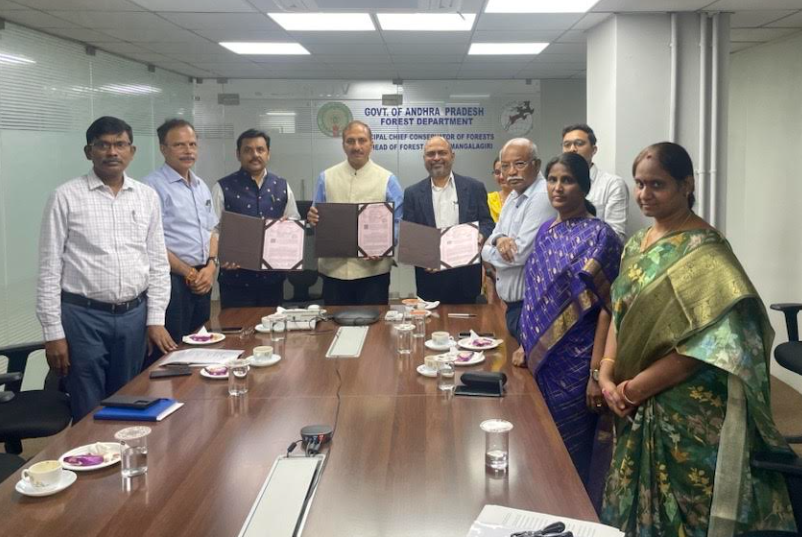Hyderabad (December 2, 2024): The Andhra Pradesh Forest Department (APFD), Andhra Pradesh Forest Development Corporation Limited (APFDC) and Bharti Institute of Public Policy at the Indian School of Business (ISB) announced a strategic collaboration to revolutionise forest management and community livelihoods in Andhra Pradesh.
Consequently, a tri-party MoU was signed with an aim to create a comprehensive Resource Inventory of Seasonal Forest Produces (SFPs) using advanced digital and geospatial technologies. By leveraging the power of data and innovation, the collaboration will unlock the potential of forest resources and empower local communities, particularly women, to drive economic growth and sustainable development.
Speaking on the occasion, Chiranjiv Choudhary, Head of Forest Force, Andhra Pradesh Forest Department said, “We envision this collaboration to be a game changer for Forest Economy in Andhra Pradesh, especially in the context of tribal communities. About 40 percent of the livelihood of tribal communities relies on forests, largely in the informal sector, not integrated into the economy. It is mostly the intermediaries who benefit from the forest economy and not the tribal communities as such. However, data shows that forests have the potential to generate a wide range of products derived from different species. Vast reserves of untapped potential exist in the form of handcrafted items and other resources that remain underappreciated in the market.”
“With this MoU, we aim to address challenges in realising this untapped potential with the help of globally recognised institutions such as the Indian School of Business. This collaboration provides us with a new opportunity to develop a strong, scalable model that stands to gain national and international recognition”, he added.
Ashwini Chhatre, Associate Professor and Executive Director, Bharti Institute of Public Policy, Indian School of Business, emphasise two points. He said, “There is a need to formalise the forest economy as it is informal and unorganised. The main challenge is the invisibility of the forest economy, which makes it difficult to invest or ensure its sustainability. With the growing interest in natural products from a climate change and sustainability perspective, private sector companies are eager to invest in environmentally sustainable products. However, companies face challenges since they have to rely on informal markets that operate far from the forest and lack visibility into the supply chain. This is where we step in. With our collaboration with the forest department, we can formalise these transactions leading to livelihoods, creating visibility, and tracking progress on the ground and step in as the need arises.”
“The state of Andhra Pradesh is uniquely positioned as it already includes the informal and invisible forest economy, and there is existing knowledge that can help create the desired visibility. There is tremendous potential for creating new opportunities, such as reforestation projects. Large tracts of open forest land can support native plants like bamboo, which not only provides economic benefits but also public goods such as environmental regeneration and improved livelihoods for local communities,” added Prof. Chhatre.
Emphasising the importance of conserving natural resources, Rajendra Prasad Khajuria, VC & MD, Andhra Pradesh Forest Development Corporation Limited (AP FDC), said, “The scope of this initiative is broad, and we are certain that this collaboration will not only benefit our forest communities but also promote the culture of scientific forest management. Despite making substantial efforts on a joint Forest Management programme, we have been facing several challenges. Now, with a renewed focus and this collaboration with the Indian School of Business, we are sure of achieving tangible results with their expertise and experience. With better management, our forests can be more sustainable, communities can gain improved livelihoods, and new business opportunities will emerge, leading to a revitalisation of the entire sector.”
